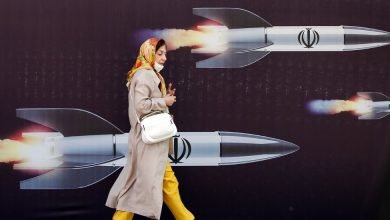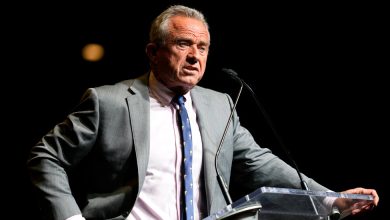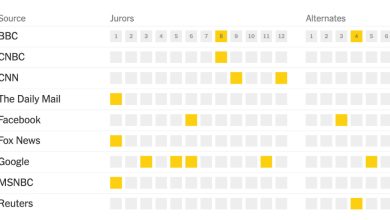David Warner, Actor Who Played Villains and More, Dies at 80

David Warner, who started his career on the British stage, including playing Hamlet with the Royal Shakespeare Company when he was just 24, then gravitated toward film and television, accumulating more than 200 credits, including “The Omen,” “Time After Time,” “TRON,” “Titanic” and “Wallander,” died on Sunday in Northwest London. He was 80.
His family said in a statement that the cause of death, at Denville Hall, a retirement home for actors, was “a cancer-related illness.”
Although Mr. Warner played a wide variety of roles, he may have been most frequently identified with villainous ones. He was Jack the Ripper in “Time After Time” in 1979; two years later, in “Time Bandits,” his character was named simply Evil Genius. In “TRON,” the 1982 film in which Jeff Bridges’s character, Kevin Flynn, is transported into the innards of a computer, he was Flynn’s nemesis in both the real and the virtual world.
“I’ve never been asked to play the happy, romantic lead,” Mr. Warner told the British newspaper The Independent in 2003. “So getting the girl is something that has never happened to me. I’ve worked with some extraordinarily beautiful women, but they never want to stay with me.”
Not that he minded roles like the one in “TRON.”
“It was fun to see it with an audience,” he told The New York Times in 1982, “hear them boo me and my gang.”
Some actors have a relatively brief run of success, but Mr. Warner remained employable for an extraordinarily long time. In his first full decade in film and TV, the 1970s, he gathered more than two dozen credits; in the 1990s, more than 80. He had a face that seemed adaptable to almost any occasion, whether the role demanded anonymity or complexity.
“Somehow he makes his face almost perfectly forgettable, like any one of a thousand faces seen in a bus station,” Vincent Canby wrote in The Times in 1968, assessing Mr. Warner’s portrayal of a soldier in a film drama called “The Borfors Gun,” intending the comment as a compliment. Some 35 years later, Emily Young, who directed him in the 2003 drama “Kiss of Life,” said basically the opposite.
“David has such a physical presence,” she told The Independent. “He seems to hold his life’s experiences in his frame and in his face.”
It was the director Peter Hall, at the time the artistic director of the Royal Shakespeare Company, who elevated the youthful Mr. Warner to theatrical prominence, casting him in several high-profile roles, including the lead in “Hamlet” in 1965. Mr. Warner gave a decidedly different interpretation of the role than theatergoers were used to, and critics were divided. One fan was Mark Gardner of The Sunday Mercury of Birmingham, England.
“This gangly, blinking, introverted young man hides his grief and insecurity under clown’s hat and khaki student’s habit,” Mr. Gardner wrote.
“It is,” he added, “a Hamlet for this bewildered, postwar generation, frustrated, unhappy, sure of nothing.”
The production ran in repertory for two years. In 2001, in an interview with The Times, Mr. Hall reflected on Mr. Warner’s performance.
“It was most importantly the Hamlet which really did define the part for the ’60s,” he said. “It was the young people’s Hamlet. David’s gentleness and passivity jibed absolutely with flower power and all that. He was wonderful.’
The occasion for that 2001 article was, astonishingly, Mr. Warner’s American stage debut at age 60 in a production of George Bernard Shaw’s “Major Barbara” by the Roundabout Theater Company in New York. It was also his first stage performance of any kind since 1972. He had stopped doing stage work, he said, in part because of anxiety about performing live.
“You see, I’m not a man of the theater,” he told The Times in 2001. “Not like McKellen and Jacobi and Ian Holm, and all those people who have worked from the bottom up, whom I admired when I was just beginning.”
Instead, while Ian McKellen, Derek Jacobi and Mr. Holm had become towering figures of the theater, Mr. Warner by that time had become known for seemingly never encountering a film or TV role he wouldn’t take. His résumé included moderately prestigious roles — he won an Emmy Award for his performance in the 1981 mini-series “Masada,” about the Roman Empire’s siege of the Masada citadel in Israel — but also a stint as a Klingon chancellor in the “Star Trek” franchise. He joked about that reputation, recounting a conversation he had with Mr. Holm, an old colleague, after they’d wrapped filming on a TV version of “Uncle Vanya” in 1991.
“I said to him, ‘What are you doing next?’” Mr. Warner told The Times. “And Ian, who was always in the best way choosy, said he was doing the Kafka film with Jeremy Irons. Then he said, ‘So what are you doing?’ I said, ‘I’m doing a thing called ‘Teenage Mutant Ninja Turtles II: The Secret of the Ooze.”’”
David Hattersley Warner was born on July 29, 1941, in Manchester, England. His parents, he told The Times in 1982, were not married and “kept stealing me from each other, so I moved around England a lot.”
He trained at the Royal Academy of Dramatic Art in London and, as he told the story, he had a seven-line part with an experimental theater company when fate came along.
“Peter Hall popped by to see the show,” he said, “which was his job, and then, about a year later, I got an invitation to audition for the Royal Shakespeare Company, and I did, and I got in.”
About the same time, he landed his first significant television role, in a British television play called “The Madhouse on Castle Street.” There was someone else who would soon be famous in that cast as well: a little-known American folk singer named Bob Dylan. The show was broadcast once, in early 1963, but the film was not preserved. It is said to have included one of Mr. Dylan’s earliest performances of “Blowin’ in the Wind.”
That same year, Mr. Warner landed his first major film role, in “Tom Jones,” playing an (of course) unappealing character named Blifil. The title role in the comic drama “Morgan!” (1966) further solidified his film bona fides.
Mr. Warner’s television work included roles in the mini-series “The War of the Roses” in the 1960s, “Holocaust” in the 1970s, “Hold the Back Page” in the 1980s, “The Choir” in the 1990s and “Conviction” in the 2000s. He had recurring roles in the series “Twin Peaks” in 1991 and “Wallander” and “Ripper Street” in this century, among others.
His family’s announcement said his survivors include his partner, Lisa Bowerman, and a son, Luke.




